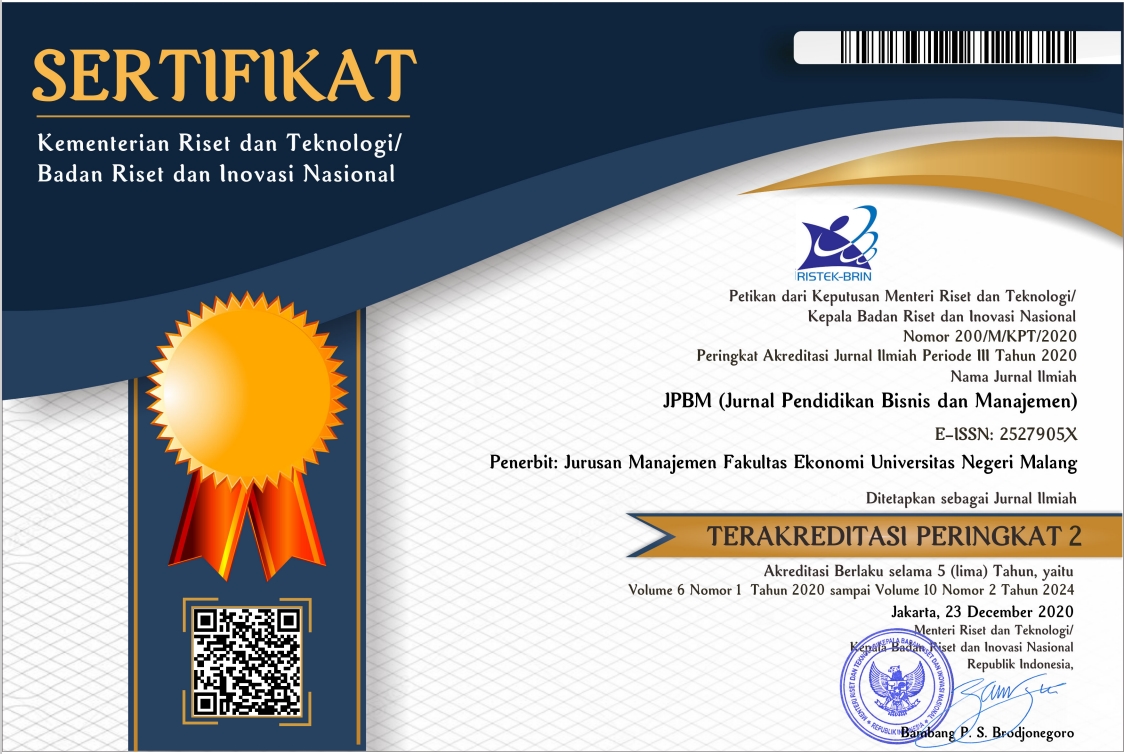Investigating Indonesian Students Entrepreneurial Intention: The Mediating Role of Entrepreneurial Attitude
Abstract
This paper investigates the mattering predictor of students’ entrepreneurial attitudes and intentions among Indonesian university students. The research involves some variables, including subjective norms, entrepreneurship education and entrepreneurial environment as a predictor of attitudes and intentions for entrepreneurship. To understand the relationship between variables, this study incorporates explanatory research using structural equation analysis. The data were gathered undergoing online questionnaires, which were provided in Google form and distributed to participants via WhatsApp. The findings indicate that students’ entrepreneurial attitude can be performed by entrepreneurship education, entrepreneurial environment and subjective norms. This finding also points out a significant link between entrepreneurial attitudes and entrepreneurial intentions. Additionally, students’ intention for entrepreneurship can be explained by subjective norms and the entrepreneurial environment. However, this finding confirms that entrepreneurship education failed in determining students’ intention for entrepreneurship. Lastly, this study also confirms the role of entrepreneurial attitudes in mediating entrepreneurship education, subjective norms and intention for entrepreneurship.
Keywords: Entrepreneurial Attitudes, Entrepreneurial Intention, Entrepreneurship Education, Entrepreneurial Environment, Subjective Norms
Full Text:
PDFReferences
Ajzen, I. (2005). Attitudes, personality and behavior. New York: Open University Press.
Alharbi, J., Almahdi, H., & Mosbah, A. (2018). The impact of entrepreneurship education programs (EEPs) on the entrepreneurial attitudes among higher education students. International Journal of Management, Economics and Social Sciences, 7(3), 245-271.
Anjum, T., Farrukh, M., Heidler, P., & Díaz Tautiva, J. A. (2020). Entrepreneurial intention: Creativity, entrepreneurship, and university support. Journal of Open Innovation: Technology, Market, and Complexity, 7(1), 11-21.
Boubker, O., Arroud, M., & Ouajdouni, A. (2021). Entrepreneurship education versus management students’ entrepreneurial intentions. A PLS-SEM approach. The International Journal of Management Education, 19(1), 100450.
Fenech, R., Baguant, P., & Ivanov, D. (2019). Entrepreneurial attitudes, self-efficacy, and subjective norms amongst female Emirati entrepreneurs. International Journal of entrepreneurship, 23(1), 1-11.
Ferreira, J., Paco, A., Raposo, M., & Rodrigues, R. (2007). Entrepreneurship education and business creation propensity: Testing a structural model. IntEnt 2007 17th Global Conference, Internationalizing Entrepreneurship Education and Training, Gdansk.
Ferreira, J., Raposo, M., Rodrigues, R., Dinis, A., & Paco, A. (2012). A Model of Entrepreneurial Intention: An application of the psychological and behavioral approaches. Journal of Small Business and Enterprise Development, 19(3), 424-440.
Florin, J., Karri, R., & Rossiter, N. (2007). Fostering entrepreneurial drive in business education: An attitudinal approach. Journal of Management Education, 31(1), 17-42.
García, J. C. S., Ward, A., Morúa, G. V., Daza, J. L. F., & Sánchez, B. H. (2018). How does cultural norms influence entrepreneurial intention?: A cross cultural study. Journal of Business, 10(1), 52-69
Gerba, D.T. 2012. Impact of entrepreneurship education on entrepreneurial intentions of business and engineering students in Ethiopia. African Journal of Economic and Management Studies, 3(2), 258-277.
Gieure, C., del Mar Benavides-Espinosa, M., & Roig-Dobón, S. (2020). The entrepreneurial process: The link between intentions and behavior. Journal of Business Research, 112, 541-548.
Gnyawali, D., & Fogel, D. (1994). Environments for entrepreneurship development: key dimensions and research implications. Entrepreneurship: Theory & Practice, 18(4), 43-62.
Gurbuz, G., & Aykol, S. (2008). Entrepreneurial intention of young educated public in Turkey. Journal of Global Strategic Management, 2(2), 47-56.
Heuer, A., & Kolvereid, L. (2014). Education in entrepreneurship and the theory of planned behaviour. European Journal of Training and Development, 38(6), 506 – 523.
Hills, G. E., & Morris, M. H. (2018). Entrepreneurship education: a conceptual model and review. In Educating entrepreneurs for wealth creation (pp. 38-53). Routledge.
Huei, C. T., Cheng, L. S., Seong, L. C., Khin, A. A., & Bin, R. L. L. (2018). Preliminary study on consumer attitude towards fintech products and services in Malaysia. International Journal of Engineering & Technology, 7(2.29), 166-169.
Jena, R. K. (2020). Measuring the impact of business management Student's attitude towards entrepreneurship education on entrepreneurial intention: A case study. Computers in Human Behavior, 107, 106275.
Karimi, S., Biemans, H., Lans, T., Mulder, M., Chizari, M. 2012. The Role of Entrepreneurship Education in Developing Students’ Entrepreneurial Intentions. Proceedings of WICaNeM 2012, The10th Wageningen International Conference on Chain and Network Science, Wageningen University, Wageningen, the Netherlands, 22.
Kristiansen, S & Indarti, N. (2004). Entrepreneurial Intention among Indonesian and Norwegian Students. Journal of Enterprising Culture, 12, 55-78.
Kusumojanto, D. D., Soetjipto, B. E., Murwani, F. D., & Sunaryanto. (2017). The effect of entrepreneurship education, parents’ role, and self-efficacy on students’ entrepreneurship intention mediated by entrepreneurship attitudes. International Journal of Applied Business and Economic Research, 15(19), 265-277.
Lee, B. (2010). University students' assessment of entrepreneurial environments theses. University of Nebraska – Lincoln
Liguori, E., & Winkler, C. (2020). From offline to online: Challenges and opportunities for entrepreneurship education following the COVID-19 pandemic. Entrepreneurship Education and Pedagogy, 3(4), 346-351.
Linan, F., & Chen, Y. W. (2009). Development and cross-cultural application of a specific instrument to measure entrepreneurial intentions. Entrepreneurship Theory and Practice. 33(3), 593-617.
Linan, F. (2004). Intention-based models of entrepreneurship education. Piccolla Impresa/Small Business, 3, 11–35.
Lorz, M. (2011). The impact of entrepreneurship education on entrepreneurial intention. The University of St.Gallen
Pejic Bach, M., Aleksic, A., & Merkac-Skok, M. (2018). Examining determinants of entrepreneurial intentions in Slovenia: applying the theory of planned behaviour and an innovative cognitive style. Economic research-Ekonomska istraživanja, 31(1), 1453-1471.
Raposo, M., Paco, A. & Ferreira, J. 2008. Entrepreneur’s profile: A taxonomy of attributes and motivations of university students. Journal of Small Business and Enterprise Development, 15(2), 405-418.
Saptono, A., Wibowo, A., Narmaditya, B. S., Karyaningsih, R. P. D., & Yanto, H. (2020). Does entrepreneurial education matter for Indonesian students’ entrepreneurial preparation: The mediating role of entrepreneurial mindset and knowledge. Cogent Education, 7(1), 1836728.
Shah, I. A., Amjed, S., & Jaboob, S. (2020). The moderating role of entrepreneurship education in shaping entrepreneurial intentions. Journal of Economic Structures, 9(1), 1-15.
Sharahiley, S. M. (2020). Examining entrepreneurial intention of the Saudi Arabia’s University students: Analyzing alternative integrated research model of TPB and EEM. Global Journal of Flexible Systems Management, 21(1), 67-84.
Taormina, R., & Lao, S. (2007). Measuring Chinese entrepreneurial motivation: Personality and environmental influences. International Journal of Entrepreneurial Behavior & Research. 13. 200-221.
Tkachev, A., & L. Kolvereid. (1999). Selfemployment Intentions among Russian Students. Entrepreneurship & Regional Development, 11, 269280.
Tsai, K. H., Chang, H. C., & Peng, C. Y. (2016). Extending the link between entrepreneurial self-efficacy and intention: a moderated mediation model. International Entrepreneurship and Management Journal, 12(2), 445-463.
Tung, L. C. (2011). The impact of entrepreneurship education on entrepreneurial intention of engineering students. Doctor of Philosophy Dissertation. Hongkong: City University of Hongkong.
Wach, K., & Bilan, S. (2021). Public support and administration barriers towards entrepreneurial intentions of students in Poland. Administratie si Management Public, (36), 67-80.
Wardana, L. W., Narmaditya, B. S., Wibowo, A., Mahendra, A. M., Wibowo, N. A., Harwida, G., & Rohman, A. N. (2020). The impact of entrepreneurship education and students' entrepreneurial mindset: the mediating role of attitude and self-efficacy. Heliyon, 6(9), e04922.
Refbacks
- There are currently no refbacks.
JPBM (Jurnal Pendidikan dan Bisnis Manajemen) is licensed under a Creative Commons Attribution-NonCommercial-ShareAlike 4.0 International License.
JPBM (Jurnal Pendidikan dan Bisnis Manajemen) is abstracted and indexed in :
















